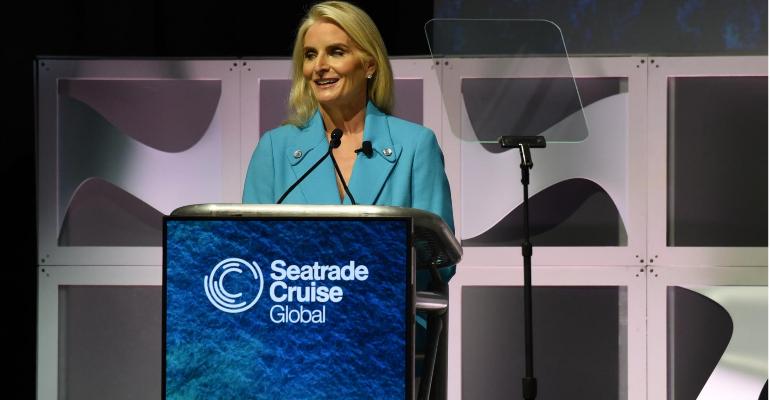Among other key findings, the report reveals more than 15% of vessels launching in the next five years will be equipped to incorporate fuel cells or batteries - and 85% of CLIA-member ships coming online between now and 2028 will be able to plug in to shoreside electricity.
Remarked Craighead, ‘Innovation and engineering are at the heart of the industry’s vision for net zero carbon cruising.
‘The cruise industry continues to lead the way by investing billions to incorporate new technologies, accelerate development of sustainable marine fuels – in particular, engines capable of using sustainable marine fuels – and enable shoreside electricity connectivity on existing and new ships.
‘These are the fundamental building blocks for the decarbonisation of global shipping, and we are acting now for the future.’
Key findings
The report outlines several ways in which CLIA ocean-going cruise lines are working to progress reductions in emissions.
40% of global capacity (up 20% year over year) are fitted to operate on shore-side electricity in the 29 ports worldwide (less than 2% of the world’s ports) where that capability is provided in at least one berth in the port. Plus, 98% of new build capacity on the order book between now and 2028 is either committed to be fitted with shore-side electricity systems or will be configured to add shore-side power in the future.
In fact, more than 15% of the vessels to be launched in the next five years will be equipped to incorporate fuel cells or batteries, and 85% of CLIA-member ships coming online between now and 2028 will be able to plug in to shoreside electricity.
Additionally, 61% of new-build capacity will rely on LNG fuel for primary propulsion - a fuel that results in 95% to 100% fewer particulate matter (PM) emissions, almost zero sulphur emissions and an 85% reduction in nitrogen emissions. LNG acts as a ‘transitional fuel’ offering benefits now while enabling LNG-ready ships to adapt to a future generation of sustainable marine fuels, continues the report.
More than 79% of global capacity utilises Exhaust Gas Cleaning Systems (EGCS) to meet or exceed air emissions requirements, representing an increase in capacity of 7% compared to 2021. 88% of capacity of non-LNG new builds will have EGCS installed, in line with an already high historical level of investments.
Lastly, when it comes to wastewater, 100% of new ships on order are specified to have advanced wastewater treatment systems; currently 78% of the CLIA ocean-going cruise line fleet capacity is served by advanced wastewater treatment systems, representing a 9% increase compared to 2021.
Sustainable fuels
Despite advancements, the report underscores an immediate need for governments to support research efforts to accelerate the development of sustainable fuels to ensure they are safe, viable and available for use at scale. CLIA is a supporter of the Getting to Zero Coalition’s Call to Action for Decarbonization of Shipping, which is in addition to the work of its individual cruise line members and their partnerships with coalitions/organisations working to find decarbonisation solutions.
CLIA Global Chairman and Executive Chairman MSC Cruises Pierfrancesco Vago said, ‘The cruise industry has always been and will continue to be at the cutting edge of innovation when it comes to environmental and maritime technologies. For this next phase of our journey to net zero as an industry, we now need clear support from governments and policy-makers to ensure that the right infrastructure is developed also on land and to encourage the investment and innovation that will be required for the development of sustainable marine fuels at scale.’
Progress in the United Kingdom
CLIA UK & Ireland MD Andy Harmer described how the UK is advancing towards a more sustainable maritime industry, stating, ‘The UK government has demonstrated its commitment to facilitating the transition to a greener maritime industry through the UK Shipping Office for Reducing Emissions (UK SHORE), which launched earlier this year to advance the UK towards a sustainable shipping future.
‘Our industry is working closely with UK SHORE through its clean maritime demonstration competition to develop new technologies that will allow the cruise sector to contribute to the government’s net zero aims, whilst making the UK a global leader in clean maritime technologies.’
Pursuing net-zero
The industry’s commitment to pursue net-zero carbon cruising by 2050 is consistent with the target set by the Paris Agreement, and is supported by the industry’s intermediary objective to reduce the rate of carbon by 40% across the global fleet by 2030, compared to 2008.
Copyright © 2024. All rights reserved. Seatrade, a trading name of Informa Markets (UK) Limited.
Add Seatrade Cruise News to your Google News feed.  |

